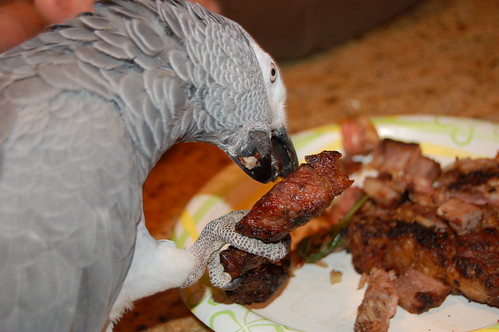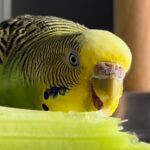Yes, some parrots do eat meat. They are omnivores and consume a variety of foods, including insects and small animals.
Parrots are fascinating creatures with diverse diets. While they are commonly known for eating seeds, fruits, and nuts, many species also consume meat. This might include insects, small animals, and even carrion. Their omnivorous nature helps them adapt to different environments and ensures they get a balanced diet.
Providing a varied diet is crucial for pet parrots to maintain their health and wellbeing. Owners should offer a mix of fruits, vegetables, grains, and occasional protein sources. Understanding their dietary needs helps in keeping parrots healthy and happy, whether in the wild or as pets.
Introduction To Parrot Diets
Parrots are colorful and intelligent birds. Their diet is crucial for their health. Understanding what parrots eat helps in providing the best care. This section explores the common beliefs and the importance of their diet.
Common Beliefs
Many people think parrots only eat seeds. This belief is not entirely accurate. Parrots enjoy a variety of foods. Let’s break down some common beliefs about their diet:
- Seeds: Seeds are a part of their diet but not the only food.
- Fruits: Parrots love fruits like apples and bananas.
- Vegetables: Leafy greens and carrots are also favorites.
- Nuts: Nuts provide essential fats and proteins.
- Insects: Some parrots eat insects for extra protein.
Importance Of Diet
A balanced diet is vital for a parrot’s health. A poor diet can lead to health problems. Here are some reasons why a proper diet is important:
- Nutrition: Parrots need a mix of vitamins and minerals.
- Energy: The right diet provides the energy they need to be active.
- Longevity: A balanced diet helps parrots live longer.
- Mental Health: A variety of foods keep their minds sharp.
Providing a mix of seeds, fruits, vegetables, and proteins is essential. Always ensure their diet is varied and balanced. This keeps your parrot healthy and happy.

Credit: www.parrotsdailynews.com
Natural Habitat And Food Sources
Parrots are known for their vibrant feathers and vocal abilities. Their diet in the wild varies widely depending on their habitat. Understanding the natural habitat and food sources of parrots can help in understanding their dietary needs, including whether they eat meat.
Wild Parrot Diet
Wild parrots eat a variety of foods. Their diet includes fruits, seeds, nuts, and flowers. These birds are also known to eat insects and small animals.
- Fruits: Berries, apples, and bananas
- Seeds: Sunflower seeds, pumpkin seeds
- Nuts: Almonds, walnuts
- Insects: Beetles, caterpillars
In some regions, wild parrots consume small animals. This includes small lizards and rodents. This shows that their diet can include meat.
Geographical Variations
The diet of parrots varies based on their geographical location. In tropical rainforests, parrots have access to a variety of fruits and nuts. The abundance of food in these areas supports their diverse diet.
| Region | Common Foods |
|---|---|
| Amazon Rainforest | Fruits, nuts, insects |
| African Savannah | Seeds, small animals |
| Australian Outback | Seeds, flowers, insects |
In drier regions, parrots often eat more seeds and small animals. This adaptation helps them survive in less fertile environments. Their diet flexibility is crucial for their survival.
Parrots As Omnivores
Parrots are often seen eating fruits and seeds. But, they are also omnivores. They consume both plants and animals. This makes their diet varied and interesting.
What Omnivore Means
An omnivore eats both plants and animals. This gives them many food options. Parrots can eat seeds, nuts, fruits, and insects. Some parrots even eat small animals. This varied diet helps them survive in the wild.
Examples In Nature
Many animals are omnivores. Bears eat fish, berries, and honey. Humans eat vegetables, fruits, meat, and dairy. Parrots are similar. They eat a mix of foods. This makes them adaptable and strong.
Instances Of Meat Consumption
Parrots are known for their colorful feathers and mimicking abilities. But have you ever wondered if they eat meat? While parrots mainly eat seeds, fruits, and nuts, there are instances where they consume meat. Let’s explore these instances in more detail.
Documented Cases
There are several documented cases of parrots eating meat. Researchers have observed wild parrots consuming insects and small animals. These cases show that parrots are opportunistic feeders.
One famous example is the Kea parrot from New Zealand. Keas have been seen eating the meat of dead sheep. This behavior is rare but highlights their adaptability.
Types Of Meat Eaten
Parrots eat various types of meat. Here’s a list of common meats they consume:
- Insects: Many parrots eat insects like grasshoppers and beetles.
- Small Birds: Some larger parrots may prey on smaller bird species.
- Rodents: Parrots like the Kea have been known to eat small rodents.
- Meat Scraps: Captive parrots might eat scraps of cooked meat offered by their owners.
Table showing types of meat and their sources:
| Type of Meat | Source |
|---|---|
| Insects | Wild |
| Small Birds | Wild |
| Rodents | Wild |
| Meat Scraps | Captivity |
These examples show the variety in a parrot’s diet.
It’s important to note that while meat consumption is not common, it does happen. This behavior is more likely in wild parrots than in pet parrots.
Nutritional Needs Of Parrots
Parrots have unique nutritional needs. Understanding these needs helps keep them healthy and happy. Parrots require a balanced diet rich in proteins, vitamins, and minerals.
Protein Requirements
Parrots need protein for growth and repair. Their diet should include protein-rich foods. These can include:
- Legumes
- Nuts
- Seeds
- Cooked eggs
Some parrots may eat small amounts of meat. This should be lean and well-cooked. Too much protein can harm your parrot. Balance is key.
Vitamins And Minerals
Vitamins and minerals are essential for a parrot’s health. They help with various body functions. Important vitamins include:
- Vitamin A
- Vitamin D
- Vitamin E
- Vitamin K
Minerals like calcium and phosphorus are crucial. They support bone health and other functions. Here’s a table of key vitamins and minerals:
| Nutrient | Function | Source |
|---|---|---|
| Vitamin A | Vision, immune function | Carrots, sweet potatoes |
| Vitamin D | Bone health | Sunlight, fortified foods |
| Vitamin E | Antioxidant | Nuts, seeds |
| Vitamin K | Blood clotting | Leafy greens |
| Calcium | Bone health | Leafy greens, dairy |
| Phosphorus | Bone health | Nuts, seeds |
Providing a varied diet ensures your parrot gets all the nutrients. Fresh fruits and vegetables should be a staple. Avoid foods high in fat and sugar. This helps maintain your parrot’s health.
Impact On Health
Understanding the impact on health of feeding meat to parrots is crucial. Parrots are omnivores, so they can eat a variety of foods. But is meat beneficial for them? Let’s explore the health benefits and risks.
Benefits Of Meat
Meat can be a rich source of protein for parrots. Protein is essential for growth and muscle repair. Small amounts of meat can provide essential amino acids that plant-based foods might lack. It can also supply necessary vitamins like B12, which supports nerve function.
- Rich in Protein
- Contains Essential Amino Acids
- Provides Vitamin B12
Potential Risks
Feeding meat to parrots can also pose risks. Meat can contain high levels of fat, which can lead to obesity. Obesity in parrots can cause heart issues and liver problems. There’s also a risk of bacterial contamination from raw meat.
- High in Fat
- Risk of Obesity
- Bacterial Contamination
Too much meat can disrupt a parrot’s digestive system. Parrots have a diet naturally rich in fruits and vegetables. Shifting their diet to meat can cause digestive issues.
- Digestive Problems
- Imbalance in Natural Diet
Always consult a veterinarian before adding meat to your parrot’s diet. They can provide guidance on safe quantities and types of meat.
Feeding Parrots In Captivity
Feeding parrots in captivity requires careful attention. Parrots need a balanced diet for good health. Their diet should mimic what they eat in the wild.
Parrots are omnivores. They eat a variety of foods, including fruits, vegetables, seeds, and sometimes meat. Let’s explore the dietary guidelines and the role of meat in their diet.
Dietary Guidelines
Parrots need a variety of foods to stay healthy. A balanced diet includes:
- Fruits
- Vegetables
- Seeds
- Nuts
- Occasional meat
Fruits and vegetables should be fresh and washed. Seeds and nuts provide essential fats and proteins. Offer a mix of these daily.
Meat As A Supplement
Parrots can eat meat as a small part of their diet. Meat provides protein and other nutrients. Offer meat occasionally to avoid excess fat.
Here is a simple table to show how often to feed meat:
| Type of Meat | Frequency |
|---|---|
| Cooked Chicken | Once a week |
| Boiled Eggs | Twice a week |
| Fish | Once a month |
Ensure meat is cooked and free from spices. Raw meat can carry bacteria. Always serve meat in small, manageable pieces.

Credit: www.quora.com
Ethical Considerations
Understanding whether parrots eat meat involves ethical considerations. These include animal welfare and environmental impact. Let’s explore these aspects in detail.
Animal Welfare
Feeding parrots meat raises questions about animal welfare. Parrots have a natural diet mostly composed of fruits, seeds, and nuts. Introducing meat can harm their health.
Parrots are not natural meat-eaters. Their digestive systems are not suited for meat. Feeding them meat may cause health problems. This can lead to a shorter lifespan.
| Food Type | Natural Diet |
|---|---|
| Fruits | Yes |
| Seeds | Yes |
| Meat | No |
Animal welfare experts suggest sticking to a parrot’s natural diet. This supports their health and well-being.
Environmental Impact
Feeding parrots meat also has an environmental impact. Meat production requires more resources than plant-based foods.
Meat production leads to deforestation, water pollution, and greenhouse gas emissions. By feeding parrots a plant-based diet, you help reduce environmental harm.
- Less water use
- Lower carbon footprint
- Reduced deforestation
Choosing a plant-based diet for parrots is kinder to the environment. It supports sustainability efforts and protects natural habitats.
Credit: www.quora.com
Conclusion
Parrots have diverse diets, including fruits, nuts, seeds, and occasional meat. Meat provides essential proteins and nutrients. Always consult a vet before introducing new foods. Understanding parrot dietary needs ensures their health and happiness. Proper nutrition is crucial for vibrant feathers and longevity.
Keep their diet balanced and varied for best results.
Ryan Everhart is a passionate bird enthusiast and blogger, primarily writing on his website, Avian Whispers. His journey into the world of bird blogging began with a deep interest in parrots, a species that captivated his attention for their intelligence and social behavior. Over time, his content expanded to cover a broader range of bird species, offering insights into bird behavior, care, habitats, and conservation.
Ryan is dedicated to educating his audience, which includes both new bird owners and seasoned enthusiasts. His writing is filled with personal experiences, expert knowledge, and practical advice on bird care. Through Avian Whispers, he aims to foster a deeper appreciation for birds, emphasizing their role in nature and the joys of having them as pets.
Starting with articles focused on parrots, Ryan’s work now encompasses a diverse range of topics such as feeding, training, habitat enrichment, and bird health. His love for birds extends beyond parrots, diving into various avian species. His informative and heartfelt writing reflects his commitment to the well-being of birds and the desire to help others connect with these creatures.
As a growing voice in the bird blogging community, Ryan strives to provide a platform where bird lovers can learn, share experiences, and connect over a shared passion for avian life. His blogs are not only educational but also serve as a reminder of the importance of protecting and nurturing the bond between humans and birds.




